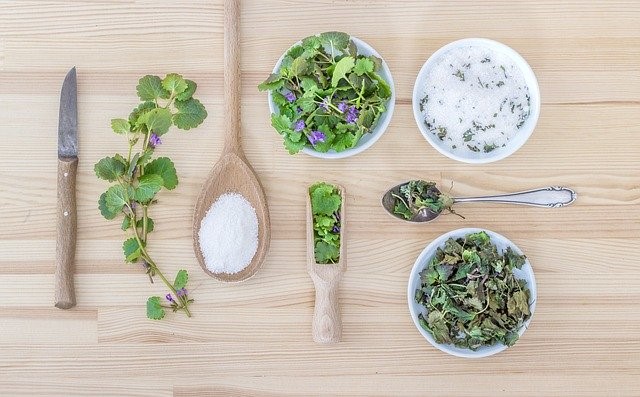5 Basic Tips for Seasoning Food
Having a reliable, well-tested recipe is definitely helpful when cooking, but also knowing a few key strategies for maximizing flavor is important. Herbs, spices, and other ingredients can add and build flavor – or “season” food – yet what or how they are used makes a big difference. Here are 5 basic tips for seasoning foods to help make you a kitchen genius.
1. Use Salt…
Salt is one of the most important flavoring ingredients. Most chefs recommend using Kosher or sea salt, rather than table salt, because the larger grains distribute more easily and dissolve quickly. Kosher and sea salt are also generally not packaged with additives and anti-caking ingredients. Some varieties or brands of salt pack a much saltier punch, so taste as you go and adjust as needed.
When preparing cold foods, keep in mind that refrigeration dulls flavors. Salt as directed when preparing the recipe, but also taste when ready to serve and add more salt if needed.
Some more expensive, large grain salts are great choices for sprinkling over a finished dish to add more flavor and act somewhat as a garnish.
2. …but also Reduce the Need for Excess Salt by Adding Acid
Acid, such as citrus, vinegar or juice, brighten flavors and oftentimes lessens the need for adding more salt to a dish. Add acids while cooking, stir in at the end, or spritz over a finished dish. Don’t forget about citrus zest, either. And remember, start small and add more if needed – a little acid goes a long way.
3. Use Fresh and Dried Herbs – at the Right Time
Fragrant fresh and dried herbs can add a great deal of flavor to a dish and adding them at the right time during the cooking process makes all the difference.
- ADD EARLY – All dried herbs and hardy fresh herbs with sturdy, woody stems such as rosemary, sage, oregano and thyme are best added early in the cooking process so they can infuse flavor into the dish.
- ADD LAST – Soft herbs with tender stems such as basil, parsley, cilantro, chives or mint are best added at the end of cooking time or as a garnish so they complement and do not become bitter.
4. Add Umami
Umami is now recognized as the fifth taste, joining sweet, salty, sour and bitter. It is described as a “pleasant savory taste”. Foods such as Parmesan cheese, tomatoes and tomato paste, mushrooms, anchovies, ketchup, molasses, seaweed, fish sauce, soy sauce, Worcestershire sauce, oyster sauce, miso paste and coconut aminos boost flavor in cooking by adding that umami aspect.
5. Fix an Ooops!
Sometimes even with the best of intentions, a dish may come out too sweet, salty or spicy. Try one of these tricks to save the day!
- TOO SWEET – try adding vinegar, citrus juice or zest, a small amount of liqueur or espresso powder
- TOO SALTY – try adding a small amount of liquid (stock or water), vinegar, citrus juice, honey or maple syrup
- TOO SPICY – try adding some sort of fat (cream, butter, sour cream, coconut milk, cheese, olive oil), honey or maple syrup
SHARE
Have a food seasoning tip? Share it with us in the comments section!
© 2020 Love + Craft Kitchen, LLC, All Rights Reserve
Main photo: Pixaby/scym


Recent Comments